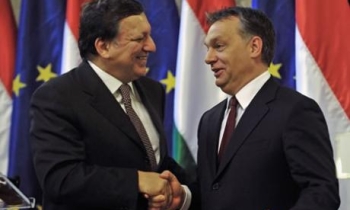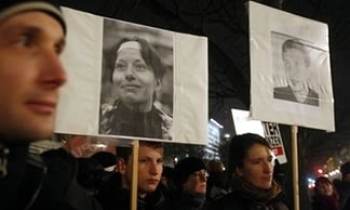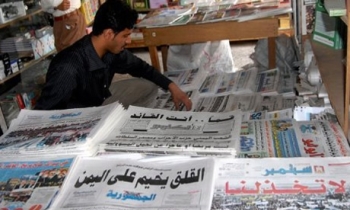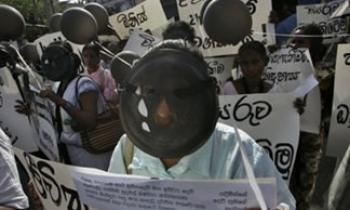When Russian journalists describe Vladimir Putin as the country's chief newsmaker, they're not exaggerating. It's not just that he's the president and attracts the expected attention--he also rules a Kremlin bureaucracy able to decide what is news.
Under Putin, Russia has experienced a dramatic rollback of media freedom, a sensitive issue as his fellow leaders of the Group of Eight major industrialized nations meet late this week in St. Petersburg. Freedom House, the U.S.-based human-rights group, ranks Russia 158th out of the 194 countries and territories for press freedom. It is urging the other G-8 leaders, the world's most powerful democratic figures, to press Putin for more open news media.
Before Putin took over in 2000, opposition voices were often heard on the three dominant television networks, particularly on the then privately owned NTV channel. There were hostile interviews with officials, merciless political satire shows, and investigations of what human-rights groups call Russia's dirty war in Chechnya. Today, NTV is owned by the state-run natural gas behemoth Gazprom, and its output differs little from that of the two big state-owned channels Rossiya and Channel One.
No criticism. A typical news broadcast on all three channels consists of showing Putin and government ministers hard at work, feel-good reports on life in the armed forces, and historical features related to the Soviet defeat of Nazi Germany. Opposition figures are rarely seen. The Center for Journalism in Extreme Situations, a leading Russian press freedom group, released a study in April that found that 91 percent of political news on Channel One was devoted to Putin and the "ruling powers." Nearly three quarters of that coverage was positive, a quarter neutral--none of it critical.
Newspapers are relatively freer, and a few, such as the daily Kommersant, are boldly critical. The Internet, where accessible, is a growing source for news. But in the world's biggest country, television is everything in shaping opinion. State-run channels, accessible to anyone with a TV, reach more than 90 percent of the 143 million population, while nontabloid newspapers rarely manage circulations of more than 100,000. (Recently, authorities have pressured radio stations to stop carrying news from Voice of America and Radio Free Europe/Radio Liberty.)
The result is a country where debate is so stifled that formal censorship becomes unnecessary, says the Carnegie Moscow Center's Masha Lipman. "The Kremlin has been pretty sophisticated in dealing with the media," she says. "It's about ensuring that big media managers are loyal, then leaving some of the small outlets free to let off steam, while ensuring they remain irrelevant." What appears on television "is a product of close cooperation between Kremlin aides and the TV network managers," she adds. "Access to information, or the ability to hold a government official to account--this doesn't exist."
Defenders of Kremlin policy flatly deny there is a problem. And mirroring arguments used by Moscow to defend against criticism of issues such as human rights, they throw the accusation back at what they view as a hypocritical West. Vladislav Surkov, a Kremlin official often seen as Putin's eminence grise, told reporters last month that alleged bias in the media's coverage of opposition figures was "a matter of taste."
Margarita Simonyan, editor-in-chief of the state's new 24-hour English-language channel Russia Today, agrees. "The state channels show the president of Russia. That is because state television should tell the people what the state is doing," she says. "I look at CNN and they constantly show [President George W.] Bush. And not only CNN. Why should Russia's president be less interesting?"
Simonyan and other Kremlin loyalists argue that Putin's breaking of private media empires since 2000 merely stopped businessmen from using television and newspapers to impose their own views. The perception that there was freedom of the press in the 1990s before Putin "is a cliche that does not correspond to reality," says Kremlin-connected political analyst Gleb Pavlovsky.
"Managed democracy." History shows that Pavlovsky is partly right. The media barons of the 1990s were key in President Boris Yeltsin's uphill re-election of 1996. Their outlets covered up stories about Yeltsin's ill health and fueled scaremongering about his Communist challenger. But where Yeltsin struck bargains with the media, Putin has simply taken control, extending his hallmark strategy of "managed democracy" from the ballot box to the TV set and printing press.
There has not been outright nationalization. Rather, media ownership has passed into the hands of Kremlin-friendly businesses like Gazprom, which also owns the formerly heavyweight, now increasingly bland newspaper Izvestia. Other well-known newspapers owned by or linked to Kremlin-connected businessmen include Nezavisimaya Gazeta, Argumenty i Fakti, and Vremya Novostei.
There are notable exceptions, including Kommersant and Vedomosti, a business newspaper partly owned by the Financial Times and the Wall Street Journal. With its hard-hitting interviews and balanced news coverage, Gazprom-owned Echo Moskvy radio is considered the standard-bearer for freedom in the electronic media. But Sergei Parkhomenko, a star of the post-Soviet media scene who was forced from his job as editor of the independent Itogi magazine in 2001, warns that outlets like Echo Moskvy or Kommersant are just window dressing. "If anything in Russia is not under government control, that's because the government has decided that it doesn't need to control that yet," he says. "The moment they want to close Vedomosti or Kommersant, they will."
And at the heart of this taming of the Fourth Estate, argues Parkhomenko, is a phenomenon running much deeper than Putin's urge to control. "The most important thing is that society doesn't support the journalists," he says. "Society doesn't demand information. We got freedom of speech as a gift in the 1990s. It just fell from the sky. But people quietly let it go, and now they struggle to remember they ever needed it."
It's a view ratified by Nikolai Svanidze, a leading anchor on Rossiya, who said in June that viewers were "tired of pluralism." "Our guests from the United States and European countries may not understand what I'm talking about," Svanidze said, "but the classic Soviet viewer is not used to alternatives. It's tiring to have a choice because you have to think."









